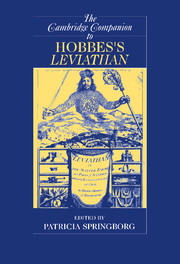Book contents
- Frontmatter
- General Introduction
- Part I: Of Man
- Part II: Of Commonwealth
- 6 Hobbes on Persons, Authors and Representatives
- 7 Hobbes on Glory and Civil Strife
- 8 Hobbes and the Philosophical Sources of Liberalism
- 9 Hobbes on the Right to Punish
- Part III: Of a Christian Commonwealth
- Part IV: Of the Kingdom of Darkness
- Part V: Hobbes’s Reception
- Bibliography
- Index
- Series List
9 - Hobbes on the Right to Punish
from Part II: - Of Commonwealth
Published online by Cambridge University Press: 28 November 2007
- Frontmatter
- General Introduction
- Part I: Of Man
- Part II: Of Commonwealth
- 6 Hobbes on Persons, Authors and Representatives
- 7 Hobbes on Glory and Civil Strife
- 8 Hobbes and the Philosophical Sources of Liberalism
- 9 Hobbes on the Right to Punish
- Part III: Of a Christian Commonwealth
- Part IV: Of the Kingdom of Darkness
- Part V: Hobbes’s Reception
- Bibliography
- Index
- Series List
Summary
It is somewhat surprising that Hobbes's theory of the right to punish - in contrast to his theory of the state of nature and his concept of sovereignty - has been so ignored, especially given how important his doctrine of punishment was for all further discussion of this question in early modern theories of natural law. In what follows I will show that Hobbes's doctrine of punishment - having reached its conceptual and theoretical zenith in Leviathan - contains some conclusions that are also important elements of modern Rechtsstaat; and that to some extent Hobbes can even be seen as the philosophical founder of this concept. In the first part of the article, I will consider some aspects of Hobbes's concept of the limits of legal coercion. In the second part, I will analyze his theory of the right to punish (jus puniendi); and finally I will discuss Pufendorf's critique of this theory.
THE LIMITS OF LEGAL COERCION
Hobbes's doctrine of punishment has had a great impact on the subsequent development of criminal law in the natural law tradition. Hobbes himself made an important contribution to replacing the theological foundation of law and the state with a completely secular theory. In the same way modern natural law theorists attempted to found the power to punish on secular reason, without regress to theological arguments. Hobbes's systematic distinction between divine and earthly justice has been fundamental for the secularization of penal law in particular.
- Type
- Chapter
- Information
- The Cambridge Companion to Hobbes's Leviathan , pp. 217 - 240Publisher: Cambridge University PressPrint publication year: 2007
- 10
- Cited by

